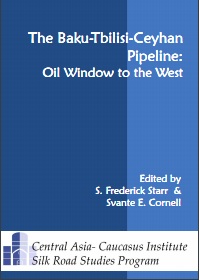CACI Webinar: The Growing Role of the S. Caucasus in European Energy Security
CACI Webinar: The Growing Role of the S. Caucasus in European Energy Security
Join our experts for a webinar discussing growing energy collaboration between the South Caucasus and Europe. They will provide a status update on growing supply of natural gas from Azerbaijan to several EU member countries, as well as on the prospect for energy transit from Central Asia and the potential for green energy supply by submarine power line under the Black Sea connecting Azerbaijan, Georgia, Romania and Hungary.
Panelists:
- Prof. Brenda Shaffer, U.S. Naval Postgraduate School
- Dr. Mamuka Tsereteli, Senior Fellow for Eurasia, Central Asia-Caucasus Institute at the American Foreign Policy Council
Moderator:
Dr. Svante Cornell, Director, Central Asia-Caucasus Institute at the American Foreign Policy Council
WHEN: Monday, March 6, 2023, 10:00-11:00 AM EST
[VIDEO POSTED] CACI Online Forum: Azerbaijan-Turkmenistan Caspian Oil Deal: Potential for Greater Regional Partnership
Azerbaijan-Turkmenistan Caspian Oil Deal: Potential for Greater Regional Partnership
On January 21, 2021 Azerbaijan and Turkmenistan signed a long-discussed and major agreement. When fully realized it will lead to the joint exploration of a major but long-contested oil field in the Caspian Sea. The agreement itself, and the opening of the "Friendship" oil deposits, are likely to have profound significance not only for the two countries but for the Caucasus and Central Asia as a whole and, equally, for the major powers.
Our distinguished guest speakers discussed this agreement, the regional collaboration that gave rise to it, and its meaning for the region and for the world.
Moderator:
S. Frederick Starr, Chairman, Central Asia-Caucasus Institute.
Speakers:
Amb. Meret Orazov, Ambassador of Turkmenistan to the United States
Amb. Elin Suleymanov, Ambassador of Azerbaijan to the United States
Ambassador Matthew Bryza, Senior Fellow, Atlantic Council
When: Tuesday, February 9, 2021 at 11:00-12:00 PM EST
The event was livestreamed on the CACI Facebook page and is now available on Youtube.
The Baku-Tbilisi-Ceyhan Pipeline: Oil Window to the West
By S. Frederick Starr & Svante E. Cornell (Eds.)
Click to Download full book as PDF file or click on individual chapters below.
1. The Baku-Tbilisi-Ceyhan Pipeline: School of Modernity 7
S. Frederick Starr
2. Geostrategic Implications of the Baku-Tbilisi-Ceyhan Pipeline 17
Svante E. Cornell, Mamuka Tsereteli and Vladimir Socor
3. Economic Implications of the Baku-Tbilisi-Ceyhan Pipeline 39
Jonathan Elkind
4. The Baku-Tbilisi-Ceyhan Pipeline: Implications for Azerbaijan 61
Svante E. Cornell and Fariz Ismailzade
5. The Baku-Tbilisi-Ceyhan Pipeline: Implications for Georgia 85
Vladimer Papava
6. The Baku-Tbilisi-Ceyhan Pipeline: Implications for Turkey 103
Zeyno Baran
7. Environmental and Social Aspects of the Baku-Tbilisi-Ceyhan Pipeline 119
David Blatchford


